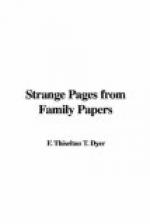Between Dillerhill and Crossford
There lies Katie Neevie’s
hoord.
And at Fardell, anciently the seat of Sir Walter Raleigh’s family, in the courtyard formerly stood an inscribed bilingual stone of the Roman British period; the stone is now in the British Museum. The tradition current in the neighbourhood makes the inscription refer to a treasure buried by Sir Walter Raleigh, and hence the local rhyme:
Between this stone and Fardell
Hall
Lies as much money as the
devil can haul.
A curious incident happened in Ireland about the commencement of the last century. The Bishop of Derry being at dinner, there came in an old Irish harper, and sang an ancient song to his harp. The Bishop, not being acquainted with Irish, was at a loss to understand the meaning of the song, but on inquiry he ascertained the substance of it to be this—that in a certain spot a man of gigantic stature lay buried, and that over his breast and back were plates of pure gold, and on his fingers rings of gold so large that an ordinary man might creep through them. The spot was so exactly described that two persons actually went in quest of the garden treasure. After they had dug for some time, they discovered two thin pieces of gold, circular, and more than two inches in diameter. But when they renewed their excavations on the following morning they found nothing more. The song of the harper has been identified as “Moiva Borb,” and the lines which suggested the remarkable discovery have been translated thus:
In earth, beside the loud
cascade,
The son of Sora’s king
we laid;
And on each finger placed
a ring
Of gold, by mandate of our
king.
The loud cascade was the well-known waterfall at Ballyshannon, known as “The Salmon Leap” now.
[Illustration: THERE CAME IN AN OLD IRISH HARPER AND SANG AN ANCIENT SONG TO HIS HARP.]
It was also a common occurrence for a miser to hide away his hoards underground, and before he had an opportunity of making known their whereabouts he died, without his heirs being put in the necessary possession of the information regarding that part of the earth wherein he had kept secreted his wealth. At different times, in old houses have been discovered misers’ hoards, and which, but for some accident, would have remained buried in their forgotten resting-place. This will frequently account for money being found in the most eccentric nooks, an illustration of which happened a few years ago in Paris, when a miser died, leaving behind him, as was supposed, money to the value of sixty pounds. After some months had passed by, the claimant to the property made his appearance, and, on the miser’s apartments being thoroughly searched, no small astonishment was caused by the discovery of the large sum of thirty-two thousand pounds. It may be noted that in former years our forefathers were extremely fond of hiding away their money for




